
A Farmer's Guide to Stock Fence Wire in the Southeast
Why a Quality Wire Coating is Non-Negotiable in the Southeast
Living and working in the Southeast (Stock Fencing Guide) means dealing with a unique climate. Our intense humidity and, for many, coastal salt air create a perfect storm for metal corrosion. This environment is the number one enemy of your farm fence.
The Enemy: Humidity and Salt Air Corrosion
Generic or low-quality fence wire simply doesn't stand a chance here. The constant moisture and salt particles in the air aggressively attack steel, leading to rust. A standard Class 1 galvanized wire, often found at big-box stores, can begin to show significant rust in as little as two to four years in the Florida Panhandle and other coastal areas Pasture Management, 2025. That isn't a fence; it's a short-term problem waiting to happen.
The Solution: Class 3 Galvanized or Zinc-Aluminum Wire
As fellow farmers, we believe in building things right so you only have to pay for them once. That means starting with the right materials. For any permanent stock fence wire in our region, we exclusively recommend Class 3 Galvanized or Zinc-Aluminum (ZA) coated wire.
Class 3 wire has a zinc coating that is 2.5 times thicker than standard Class 1 wire. This provides a service life of 20 years or more, even in our humid climate. It's the most cost-effective decision you can make, protecting your investment and preventing the headache of constant repairs and premature replacement. A long-lasting fence starts with proper materials and a professional build, which is why many farmers choose our farm fence installation for durable results in the Southeast climate.
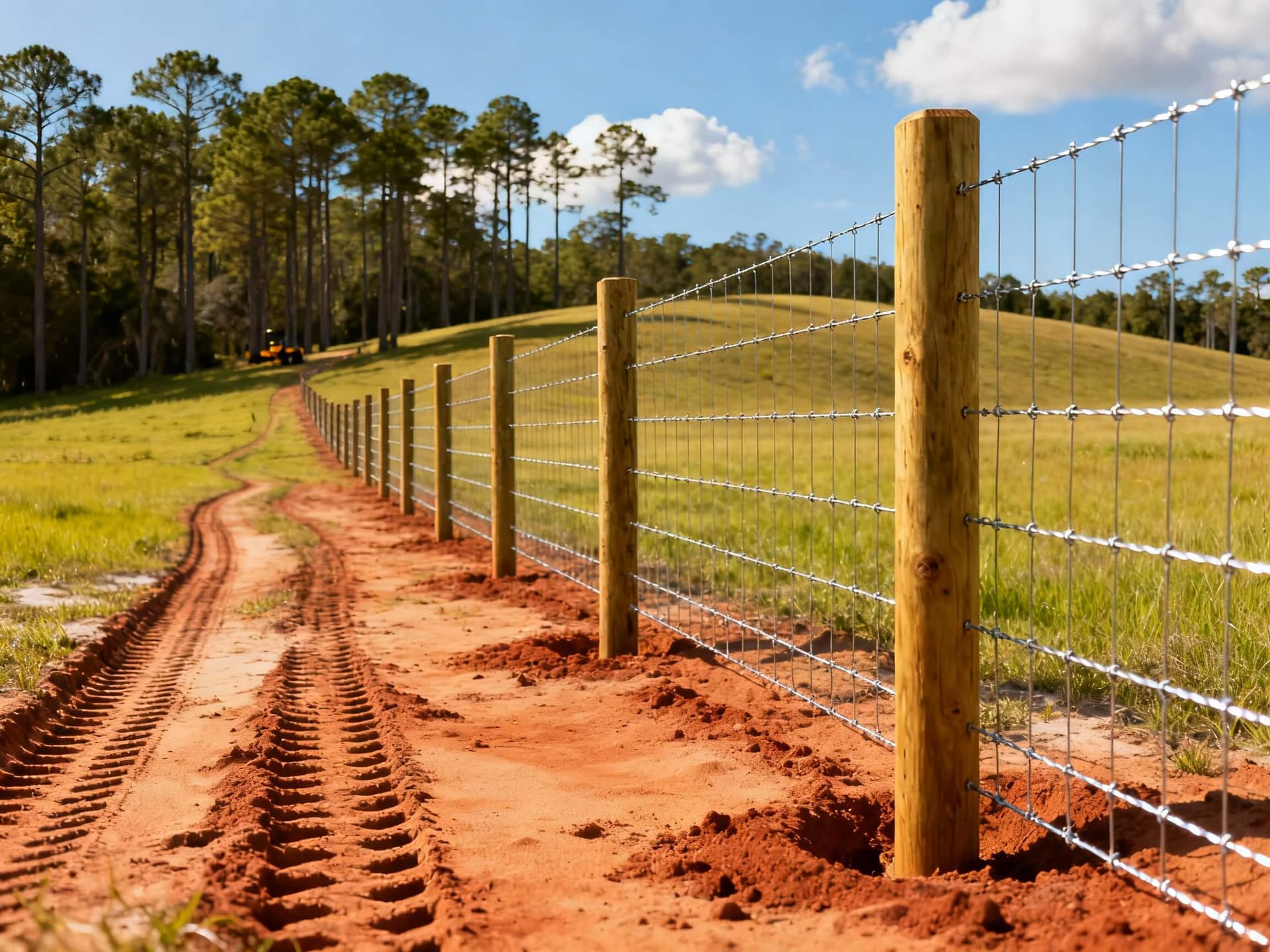
Comparing the Top 3 Types of Livestock Wire
Once you’ve settled on a quality coating, the next step is choosing the type of wire that fits your farm's layout and your animals' needs. The three main options each have their place.
High-Tensile Wire: The Modern Standard for Strength and Value
High-tensile wire is the new benchmark for modern stock fencing for good reason. It’s incredibly strong and durable, allowing for wider spacing between posts. This reduces the total number of posts you need, saving you significant money on both materials and labor, especially over large pastures common in South Georgia. It's a smart investment for a long-lasting, low-maintenance fence.
If you're planning to upgrade or expand a pasture, our high tensile fence installation service ensures the system is built with proper tensioning, bracing, and long-term durability.
Woven Wire (Field Fence): The Safest & Most Versatile Option
Woven wire, also known as field fence, is perhaps the most versatile and safest choice for a livestock wire fence. The smooth wires and tight construction prevent animals from getting tangled or injured, making it ideal for a variety of livestock. Its grid-like structure also offers excellent protection from predators, securing your animals from multiple threats.
Barbed Wire: The Traditional, Low Up-Front Cost Choice
Barbed wire is a traditional option known for its low initial material cost. While it can be an effective barrier for containing cattle across vast acreage, it comes with trade-offs. The barbs pose an injury risk to animals, and its shorter lifespan often leads to a higher lifetime cost due to more frequent repairs and replacement. We typically recommend it for property lines or large pasture divisions where animal contact is minimal.
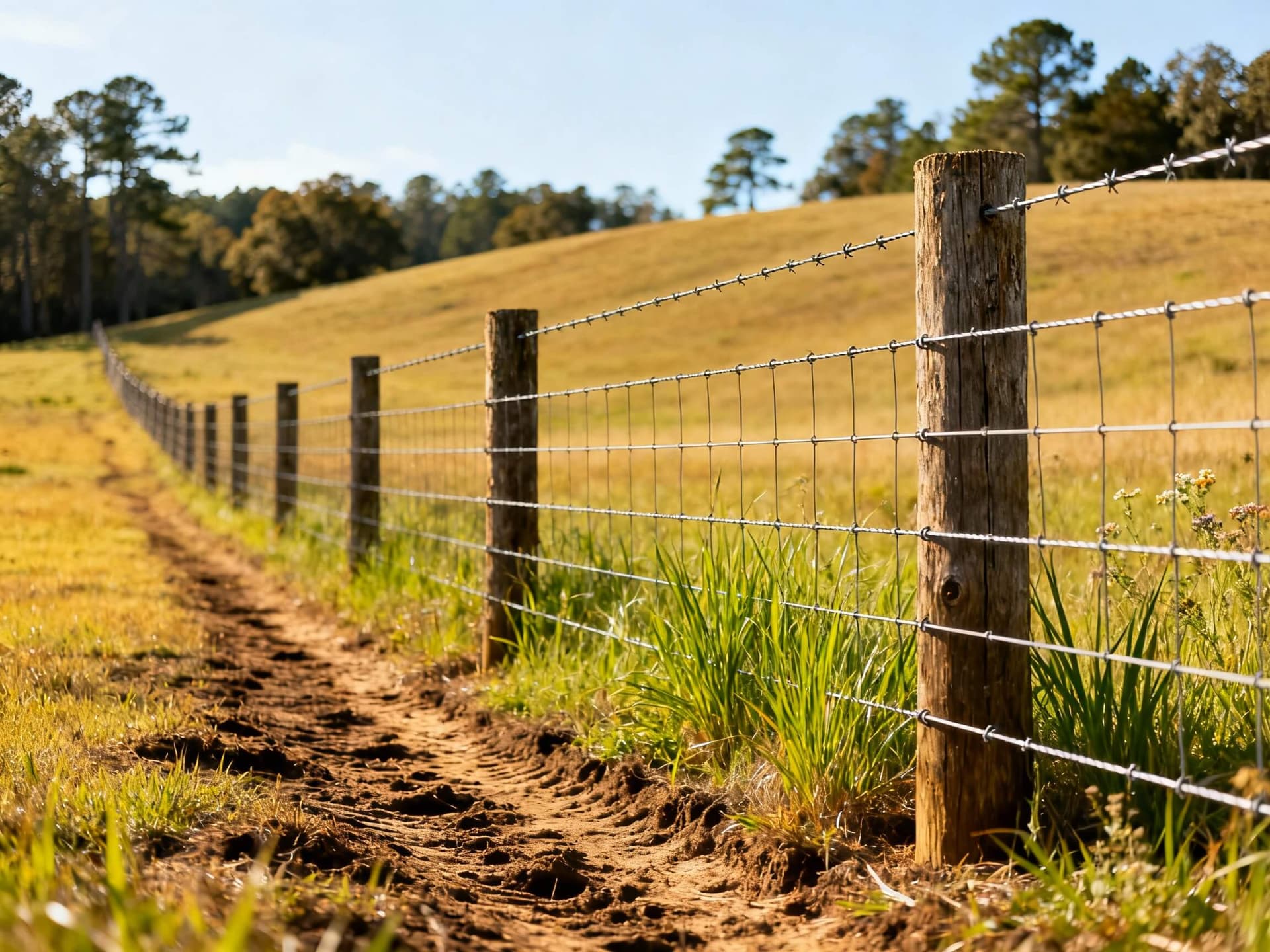
Matching the Wire to Your Livestock's Needs
Need Help?
Get expert fencing advice and free quotes. Our team is ready to help with your project.
Available Mon-Fri, 8am-6pm EST
The "best" stock fence wire always depends on the animals it will contain. A fence that works for a calm herd of cattle won't stand a chance against a determined goat.
Cattle Stock Fencing: Strength and Durability
Cattle exert a lot of pressure on a fence, especially when leaning and grazing. For effective cattle stock fencing, we recommend a strong 47-inch woven wire fence. For added security, a strand of barbed wire along the top can discourage leaning entirely. Alternatively, a well-built 5 to 6-strand high-tensile system is an excellent, durable choice.
Horse Fencing: Prioritizing Safety and Visibility
Horses are powerful and prone to panic, so safety is the top priority. "No-climb" woven wire with small 2"x4" openings is the standard, as it prevents a horse from getting a hoof stuck. Adding a top rail or "sight board" is critical to ensure the horses can easily see the fence line, helping prevent accidental collisions and serious injuries.
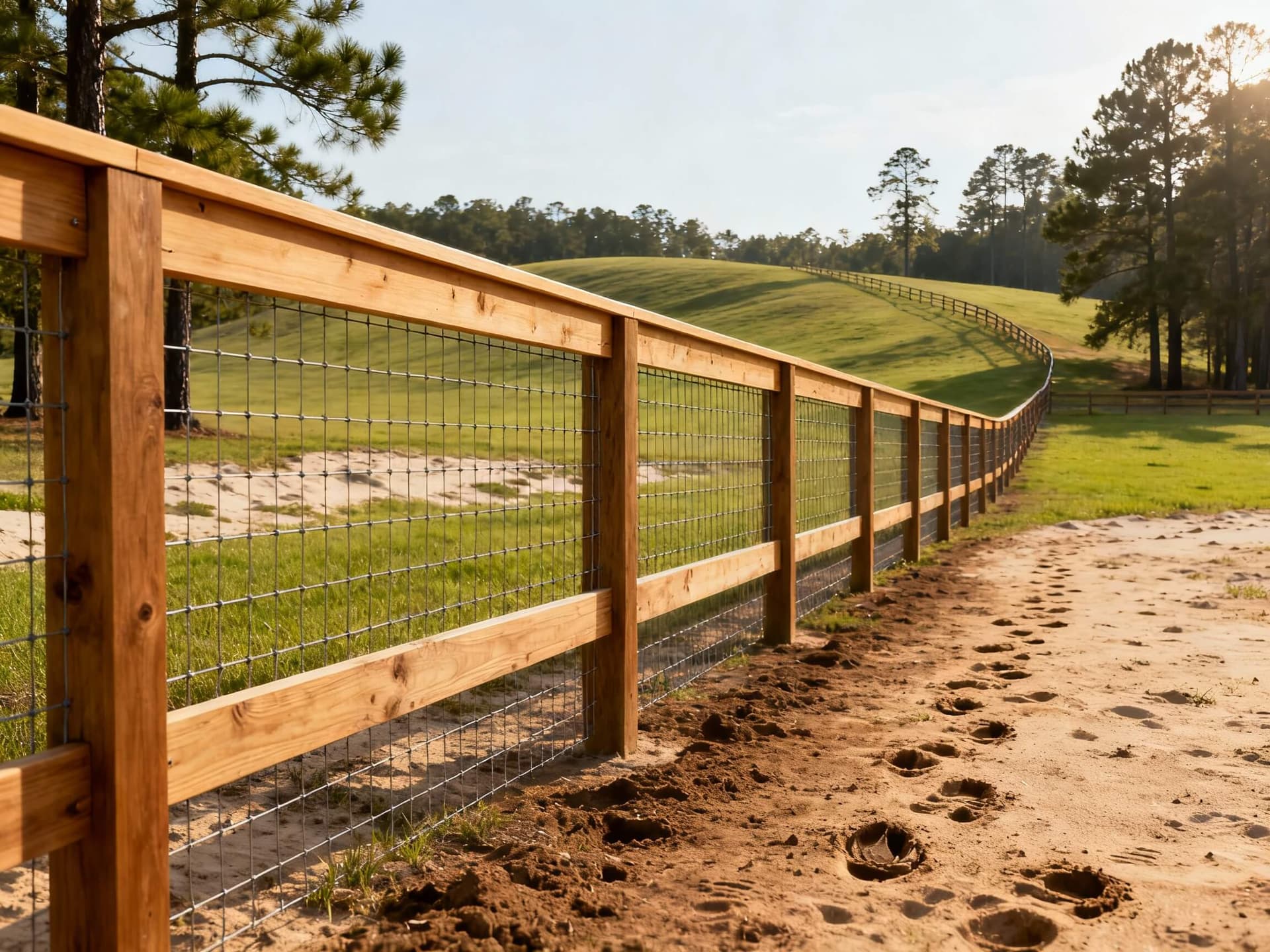
Goat Fencing: Designing an Escape-Proof Barrier
Anyone who has raised goats knows they are masters of escape. For homesteads in South Alabama and across the region, a standard fence just won't do. You need woven wire with tight 4"x4" squares to keep them from climbing or squeezing through. The fence must also be installed tight to the ground to stop them from crawling underneath.
Why Professional Installation is Crucial in Our Region
The best wire in the world will fail if it's not installed correctly. In the Tri-State area, our unique soil conditions make professional installation a necessity, not a luxury.
Overcoming Sandy and Saturated Soils
Much of Florida is built on sandy soil, which offers very poor stability for fence posts. A standard 24-inch post depth is simply not enough; posts will shift and lean, causing the fence to sag and fail. Our experience has taught us that posts must be set 30 to 42 inches deep and secured with concrete to create a solid foundation that will stand strong for decades SW Fences Port St. Lucie, 2025.
The Value of Expert Tensioning and Bracing
A fence's strength comes from its structure. We build robust H-braces at every corner and end to handle the immense pressure of properly tensioned wire. Getting the tension just right is an art—too loose and the fence will sag; too tight and it can snap under pressure. This expertise is the difference between a fence that lasts 5 years and one that serves your farm for 30.
Frequently Asked Questions About Stock Fence Wire
What is the best all-around stock fence wire for a farm in the Florida Panhandle?
For most mixed-use farms in the Florida Panhandle, a Class 3 Galvanized woven wire fence offers the best combination of safety, security, and longevity. It effectively contains various livestock and holds up against our humid, often salty air.
How much does a professional livestock wire fence installation cost in South Georgia?
The cost varies based on terrain, soil conditions, and the specific fence system, but you can typically expect a professional installation to range from $1.60 to over $4.50 per linear foot. The investment in a professional build with quality livestock wire pays for itself by avoiding costly repairs and early replacement.
Is high-tensile wire better than woven wire for cattle stock fencing?
Both are excellent choices. High-tensile is often more cost-effective for very large, open pastures due to needing fewer posts. Woven wire provides a more solid physical barrier, which can be better for smaller paddocks, areas with higher stock density, or for containing calves.
How can I stop my stock fence wire from rusting so quickly near the coast?
The key is to start with the right material. You must use a wire with a superior coating, like Class 3 Galvanized or a Zinc-Aluminum finish. These coatings are specifically designed to provide long-term protection against the corrosive effects of salt air and humidity, ensuring your stock fence wire lasts for decades.
Your Partner for a Fence That Lasts
Choosing the right stock fence wire comes down to three key pillars: a high-quality coating to fight our climate, the right wire design for your specific animals, and professional installation that accounts for our region's unique soil. Getting these three things right is the secret to a fence that protects your animals and provides peace of mind for decades.
You wouldn't build a barn on a weak foundation, and your fence is no different. For a durable fence built right the first time with expert knowledge of our local conditions, contact Bomann Fencing for a free estimate on your project in the Florida Panhandle, South Alabama, or South Georgia (Complete Stock Fencing Guide).
Share this article
Related Posts
Need Help?
Get expert fencing advice and free quotes. Our team is ready to help with your project.
Available Mon-Fri, 8am-6pm EST
Related Posts
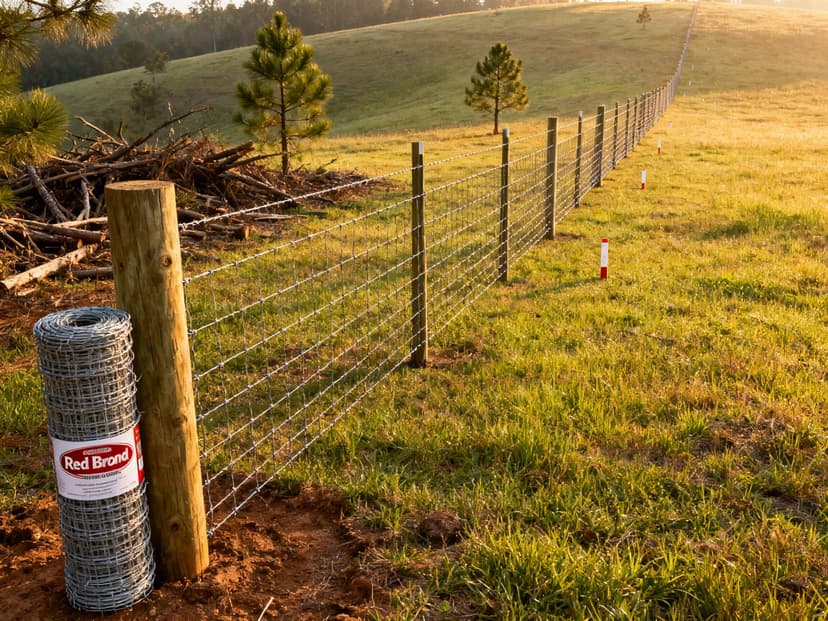
330 x 4 Fence Guide: Pro Installation Tips & Costs
Planning Your 330 x 4 Fence: Materials & Layout A successful livestock fence starts long before the first post is driven...
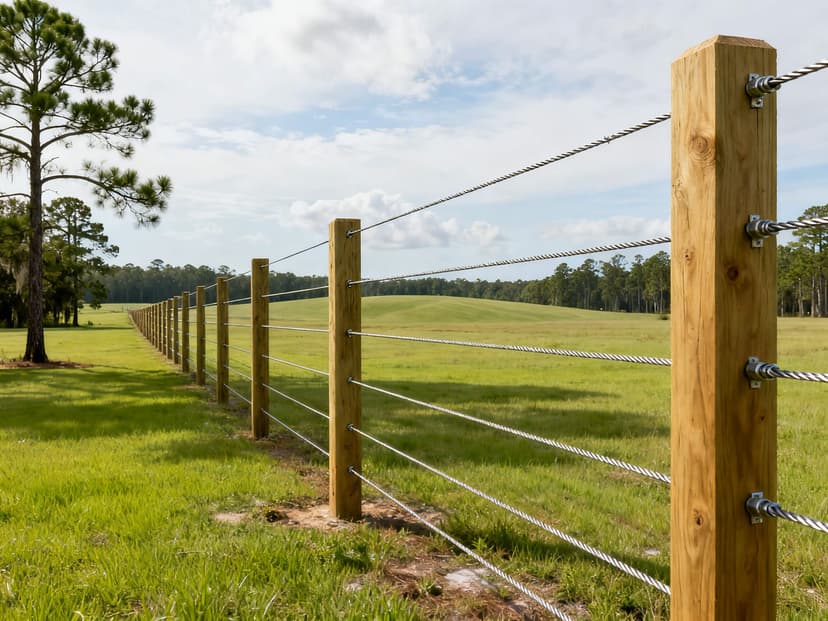
Cable Fence for Cattle: The SE Rancher's Durable Choice
Why Choose a Cable Fence System for Your SE Ranch? You need a strong, reliable fence to contain your cattle across large...
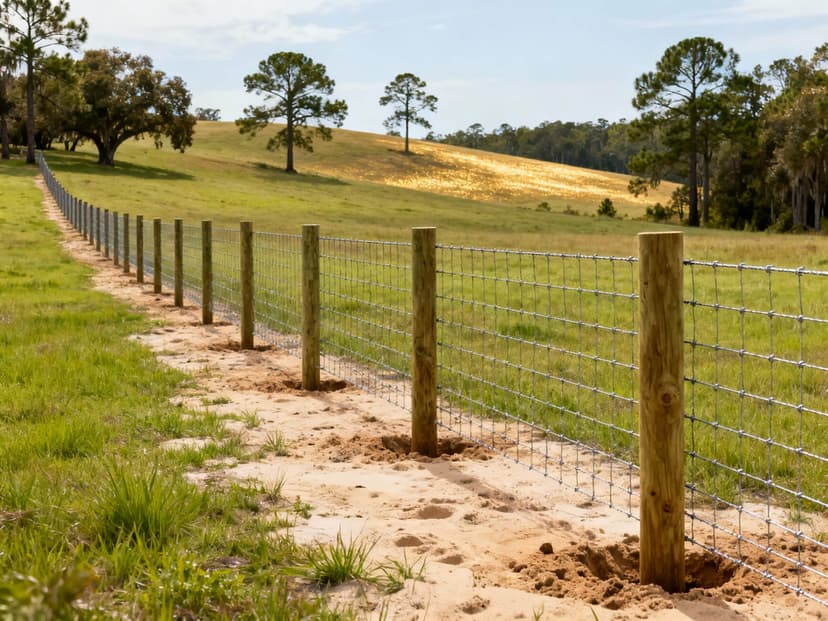
Cattle Fence Roll: The Complete Guide for Southeast Farms
Understanding Your Cattle Fence Roll Options When fencing a large operation, the type of wire you choose is a decision t...
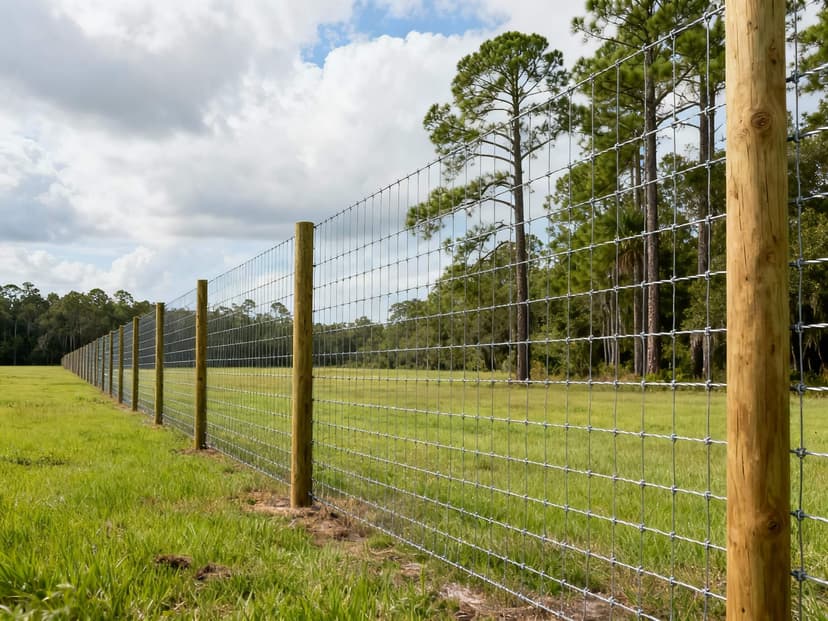
6 Proven Applications for a 6 Foot Field Fence
6 Proven Applications for a 6 Foot Field Fence As a farmer or rancher in the Southeast, you need a fencing solution that...
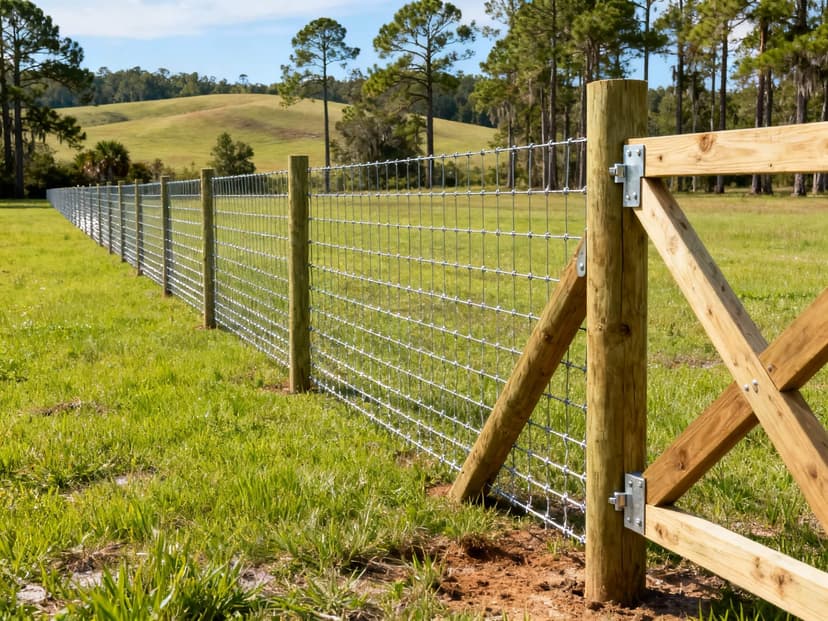
4 ft Field Fence: A Farmer's Guide to Cost & Setup
A Complete Guide to 4 ft Field Fence for Your Modern Farm For farmers and ranchers across the Florida Panhandle, South A...






